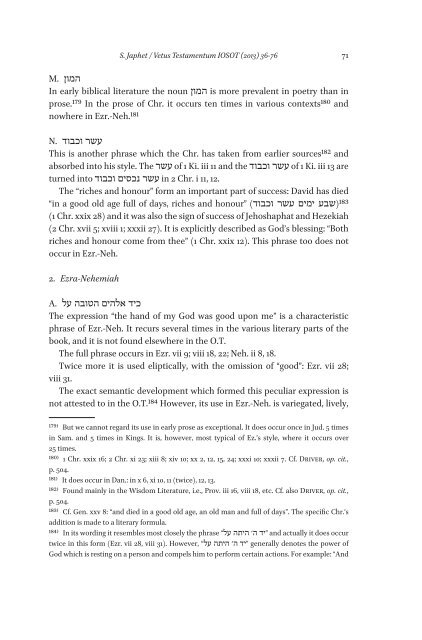Special Issue IOSOT 2013 - Books and Journals
Special Issue IOSOT 2013 - Books and Journals
Special Issue IOSOT 2013 - Books and Journals
You also want an ePaper? Increase the reach of your titles
YUMPU automatically turns print PDFs into web optimized ePapers that Google loves.
S. Japhet / Vetus Testamentum <strong>IOSOT</strong> (<strong>2013</strong>) 36-76 71<br />
המון .M<br />
In early biblical literature the noun המון is more prevalent in poetry than in<br />
prose.179 In the prose of Chr. it occurs ten times in various contexts180 <strong>and</strong><br />
nowhere in Ezr.-Neh.181<br />
עשר וכבוד .N<br />
This is another phrase which the Chr. has taken from earlier sources182 <strong>and</strong><br />
absorbed into his style. The עשר of 1 Ki. iii 11 <strong>and</strong> the עשר וכבוד of 1 Ki. iii 13 are<br />
turned into עשר נכסים וכבוד in 2 Chr. i 11, 12.<br />
The “riches <strong>and</strong> honour” form an important part of success: David has died<br />
183(שבע ימים עשר וכבוד) honour” “in a good old age full of days, riches <strong>and</strong><br />
(1 Chr. xxix 28) <strong>and</strong> it was also the sign of success of Jehoshaphat <strong>and</strong> Hezekiah<br />
(2 Chr. xvii 5; xviii 1; xxxii 27). It is explicitly described as God’s blessing: “Both<br />
riches <strong>and</strong> honour come from thee” (1 Chr. xxix 12). This phrase too does not<br />
occur in Ezr.-Neh.<br />
2. Ezra-Nehemiah<br />
כיד אלהים הטובה על .A<br />
The expression “the h<strong>and</strong> of my God was good upon me” is a characteristic<br />
phrase of Ezr.-Neh. It recurs several times in the various literary parts of the<br />
book, <strong>and</strong> it is not found elsewhere in the O.T.<br />
The full phrase occurs in Ezr. vii 9; viii 18, 22; Neh. ii 8, 18.<br />
Twice more it is used eliptically, with the omission of “good”: Ezr. vii 28;<br />
viii 31.<br />
The exact semantic development which formed this peculiar expression is<br />
not attested to in the O.T.184 However, its use in Ezr.-Neh. is variegated, lively,<br />
179) But we cannot regard its use in early prose as exceptional. It does occur once in Jud. 5 times<br />
in Sam. <strong>and</strong> 5 times in Kings. It is, however, most typical of Ez.’s style, where it occurs over<br />
25 times.<br />
180) 1 Chr. xxix 16; 2 Chr. xi 23; xiii 8; xiv 10; xx 2, 12, 15, 24; xxxi 10; xxxii 7. Cf. Driver, op. cit.,<br />
p. 504.<br />
181) It does occur in Dan.: in x 6, xi 10, 11 (twice), 12, 13.<br />
182) Found mainly in the Wisdom Literature, i.e., Prov. iii 16, viii 18, etc. Cf. also Driver, op. cit.,<br />
p. 504.<br />
183) Cf. Gen. xxv 8: “<strong>and</strong> died in a good old age, an old man <strong>and</strong> full of days”. The specific Chr.’s<br />
addition is made to a literary formula.<br />
184) In its wording it resembles most closely the phrase ה׳ היתה על“ ”יד <strong>and</strong> actually it does occur<br />
twice in this form (Ezr. vii 28, viii 31). However, ה׳ היתה על“ ”יד generally denotes the power of<br />
God which is resting on a person <strong>and</strong> compels him to perform certain actions. For example: “And








![Am HaSefer [Volk des Buches] - Books and Journals](https://img.yumpu.com/20648352/1/174x260/am-hasefer-volk-des-buches-books-and-journals.jpg?quality=85)







